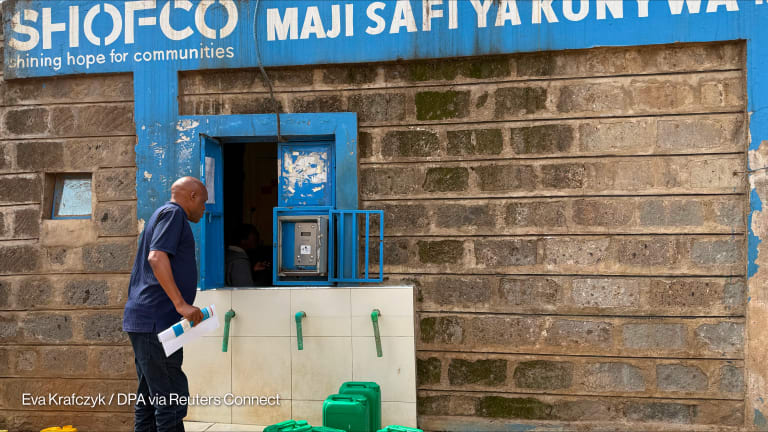
CANBERRA — As humanitarian organizations find themselves faced with supporting more populations impacted by natural and man-made crises, they must embrace localization as a way to make the sector more responsive and innovative, experts said at the recent 2019 Asia Pacific Humanitarian Leadership Conference.
“If we are serious about innovation, we need to fund local actors and then get out of their way,” Adeso Executive Director Degan Ali said in a keynote address.
“There is a preconceived notion that anything local is not as good as international. This is something we have to challenge across the sector.”
— Stephen McDonald, director, Centre for Humanitarian LeadershipLocalization recognizes and supports the local community in being the leaders, decision-makers, and implementers of solutions impacting their country. This is not new to the development agenda and for the humanitarian sector became a priority for action through the "grand bargain" agreed to at the 2016 World Humanitarian Summit.
Goal two of the bargain aims to achieve “a global, aggregated target of at least 25 percent of humanitarian funding to local and national responders as directly as possible to improve outcomes for affected people and reduce transactional costs” by 2020.
But it is still a work in progress according to Lan Mercado, Asia regional director for Oxfam.
“We need to shift the supply-driven system where donors, the U.N. system, and INGOs, including Oxfam, dictate terms to local communities and organizations to one where decision-making power lies with local actors," she said in her address to the conference.
And a key barrier that needs to be addressed to make localization work, according to Ali, is “the racism that operates in the humanitarian system and prevents localization.”
New humanitarian thinking supported by localization
Despite the barriers, a range of experts showed how a new way of thinking about encouraging greater locally led leadership will improve humanitarian responses.
One area is in compassionate palliative care in conflict settings, which Rachel Coghlan from the Centre for Humanitarian Leadership told Devex can be better enabled through localization.
“There are many situations, especially in the most resource-limited humanitarian contexts, where all you may have is small acts of compassion and palliative care,” she said. “By that I mean things like simply providing a compassionate presence and being with a patient to hold their hand or give them a sip of water if they need it and acknowledging they have particular fears about illness and dying and providing the emotional, social, and spiritual support needed.”
“These are things that can be provided at the community level and by community health workers or family even, and by nonspecialists. These acts are no less valid or impactful than providing morphine, for example.”
A greater focus on localization may also help to better understand and address the violence facing female aid workers — which Tanya Stelmach, a doctoral candidate at RMIT University, said is underexamined and underreported in the humanitarian space. She believes by better understanding violence, the humanitarian sector can better understand barriers preventing women from entering and remaining in the sector.
“There are a number of different tensions to explore through human stories and anecdotes — including the difference in violence against national and local staff members compared to international actors,” she said. “And this is something we need to be talking about more and bringing to the table.”
Trust in data?
Several experts discussed the use of technology and data in the humanitarian landscape, and whether local data was being accepted by international organizations.
“The localization discussion is really highlighting our trust in data,” Stephen McDonald, director at the Centre for Humanitarian Leadership, explained to Devex. “One of the challenges we heard at the conference is that responders often go to talk to international or U.N. agencies in the time of a crisis and present the data they have collected — but are not believed that the data is true or accurate. There is a preconceived notion that anything local is not as good as international. This is something we have to challenge across the sector.”
Data from social media was often more likely to be looked at rather than locally collected sources to track a crisis, but McDonald said this can exclude people who don’t have access to technology — often the most vulnerable groups in a crisis.
By taking a wider look at the notion of “good data” in a humanitarian setting, McDonald said local communities can have a better control over their data needs — as well as help international NGOs understand how the data can be made more useful for local organizations to take an evidence-based approach in disaster preparedness and response.
Progress on localization
Despite the challenges of increasing localization, progress has been made in enabling local leadership.
Disaster risk management officer with The Pacific Community, Noa Tokavou explained that localization is a concept being embraced by governments in the Pacific with 15 countries implementing disaster risk management acts and plans, with purpose-built emergency operation centers in various stages of progress for each country.
According to Tokavou, these frameworks have expanded the adaptive capacity of local communities who bring strong traditional leadership, an understanding of food crops tolerant to local conditions, traditional skill in constructing houses using local materials, and knowledge of medicinal benefits of local herbs.
Asked what negatives he has seen, Tokavou said, “None so far,” instead pointing to examples of how the communities have built greater resilience to natural disasters through better understanding of their capacity and what it takes to return to normalcy.
The only barriers were international partners who, at times, continue to undermine local leadership, he said.
Search for articles
Most Read
- 1
- 2
- 3
- 4
- 5








